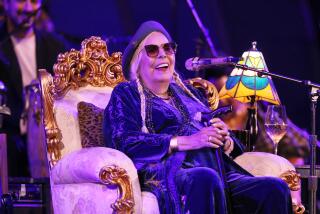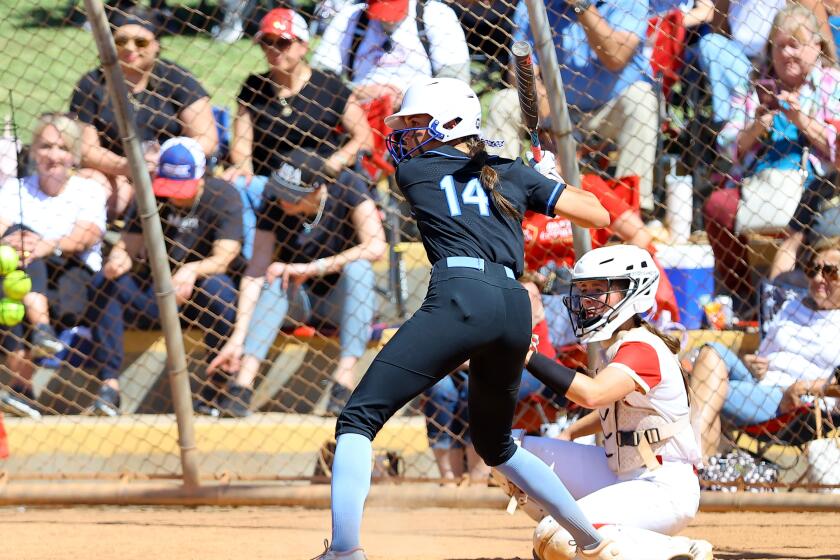Beating the Odds
- Share via
Richie Mitchell had some wild ideas while he was fighting for his life against leukemia.
Knowing that spring football was approaching, Mitchell, a standout player for Chino Hills Ayala, asked his doctors whether he could work out in the hospital. At the time, he was vomiting almost daily because of chemotherapy and had a feeding tube stuck in his chest.
“I was thinking crazy,” Mitchell recalled. “The doctors would sit back and laugh.”
Bolstered by youthful naivete, Mitchell never gave up hope that he would play football again. Few shared his optimism.
“I never thought he’d play again,” said Dick Mitchell, Richie’s father. “I didn’t think he’d be physically able to do it.”
More than a year after overcoming leukemia, Mitchell is nearing the end of a remarkable comeback season. He beat the odds in every way, including being granted a rare fifth year of athletic eligibility.
In the process, he has become an inspiration for his Ayala teammates and coaches.
“It’s a testimony to Richie’s perseverance and his resiliency that he wanted to play one more year,” Ayala Coach Bob Mount said. “If nothing else, it was that light at the end of the proverbial tunnel that gave him something to live for.”
Mitchell acknowledged as much when, recalling his fight against leukemia, he said, “Football is the only thing I did know. I’m not a cancer expert.”
Mitchell is considered a senior, though his class and most of his friends graduated last spring. Mitchell plans to graduate after the current semester ends in December. He turns 19 in January.
The opportunity to play football again after sitting out last season allowed him to fulfill a personal goal. Though Ayala (3-6) isn’t as good as it was last season, when the Bulldogs won the Sierra League title, Mitchell has enjoyed his time on the field.
He rarely comes out of games, starting at fullback and linebacker and playing on special teams. Standing a solid 5 feet 10 and 190 pounds, he is considered among the hardest hitters on the team and sports a gash across the bridge of his nose, the result of repeated collisions.
“I figure everything happens for a reason,” he said. “So, yeah, I missed out on a great team last year. But football is football. It’s just as much fun this year. It’s not all about if you win or not.”
Returning this year allowed Mitchell to play alongside his younger brother Joey, a senior offensive lineman. Joey was the donor for Richie’s bone-marrow transplant.
“It’s great playing with my brother,” Richie said. “I don’t look at [my teammates] as being a year younger than me, or that they’re little kids.”
Mitchell had distinguished himself as one of Ayala’s best players as a junior in 2001, helping the Bulldogs win the league title. But several weeks after the season, he began feeling tired and was spitting up blood.
After getting the results of a blood test, Mitchell’s family doctor told him to go to the hospital emergency room. That same day, Feb. 8, 2002, more tests revealed that he had leukemia.
“I was just shocked,” Mitchell said. “I thought I had mononucleosis, actually.”
He was diagnosed with acute myelogenous leukemia, an aggressive form of the disease that usually requires a bone-marrow transplant to survive.
“The doctors didn’t pull any punches from the beginning,” Dick Mitchell said. “They told me Richie was in for a rough go.”
Richie was admitted to Children’s Hospital of Orange County in Orange, where he began a long, arduous battle for his life. Chemotherapy robbed him of his stamina and strength, which had been built up through weightlifting. The treatments made him sick and caused his hair to fall out.
“I’d mark off every single day on the calendar,” he said. “I’d ask all the time, ‘Am I getting out yet? How much longer?’ You get used to the sickness, [but] the walls start closing in. There’s not much you can do.”
Several weeks into that wearying routine, Mitchell contracted a viral infection that, combined with an already weakened immune system, nearly killed him. Pumped full of drugs, he drifted in and out of consciousness.
All the while, his father was there for support. Dick Mitchell slept on a couch bed in his son’s hospital room before rising early to return home and get ready for work.
He returned to the hospital whenever he could, cleaning up for his son and helping him take showers when he was strong enough to stand.
“It brought me and my dad closer,” Richie said. “He had to do everything for me.”
The infection set back the timetable for a bone-marrow transplant.
“They were some bad times,” Dick Mitchell recalled. “But looking back, they weren’t that bad. There are some kids who never come out. We were one of the fortunate ones.
“The thing that Richie had going for him from the beginning was that he was a strong kid. He was in great shape.”
Richie’s situation brightened considerably when it was learned that his brother was a perfect match as a bone-marrow donor. The procedure was performed in June 2002.
“We were lucky the way it worked out,” Joey said. “I was just happy to do what I could.”
The transplant was a success, and Richie returned home a few weeks later. He was required to wear a surgical mask to help protect him from infection and doctors said he probably wouldn’t be able to go out in public for several months, Dick Mitchell said.
But Richie made a stunningly swift recovery. He was in class for the first day of school in September.
“Doctors looked at the progress he made in a short time,” Dick Mitchell said. “They felt it would be better for him psychologically to be around his own friends than sitting in his room. That was a big boost for him.”
Though he was in no shape to play football, Richie was made a team captain and cheered from the sideline during their championship season.
“It was frustrating, but I was happy for all my friends,” he said. “I played with them for a long time. Cheering them on was great.”
Mitchell figured that if he was going to play football again, it would probably have to be at a community college.
But after last season, Ayala’s coach at the time, Lou Randall, asked Mitchell whether he would be interested in applying for a hardship waiver that would allow him to play in 2003. Though he had enough credits to graduate, Mitchell decided one more season of high school football was worth returning for a fifth year at Ayala.
The Southern Section granted the hardship waiver and Mitchell participated in spring football after getting medical clearance.
Meshing with his younger teammates presented another challenge. When Mount, who was an Ayala assistant, was named head coach after Randall took the coaching job at Riverside North last spring, he quickly noticed that Mitchell separated himself from everyone else.
“The team sat on one side of the room,” Mount said. “Richie was on the other side by himself. He hadn’t bonded with those guys because they looked up to him.”
Mitchell said it didn’t take long to break down those barriers.
“It’s fine now,” he said. “We’re all pretty close.”
Nick Ketelsleger, a senior lineman, said it was strange at first to have Mitchell on the team.
“He grew up playing with all these older guys,” Ketelsleger said. “But it’s been fun having him here.”
Mount, 51, said having Mitchell this season has been invaluable because he leads by example.
“He’s one of the most dependable kids I’ve ever coached,” Mount said. “He never misses a practice, he’s always punctual. He always gives 100%.
“He’s like having a coach on the field.”
When Mitchell finally did step on the field again for Ayala’s season opener against Santa Maria Righetti, it was an emotional moment.
“It was probably one of the best feelings you could have,” he said. “To finally be there, it was a big thrill.”
Despite everything he’s been through, Mitchell has no intention of taking it easy or playing it safe in life.
He hopes to become a firefighter, a job that took on added significance in the last month in Southern California because of the wildfires.
“I have a lot of respect for those guys,” he said. “They put their lives on the line.”
More to Read
Get our high school sports newsletter
Prep Rally is devoted to the SoCal high school sports experience, bringing you scores, stories and a behind-the-scenes look at what makes prep sports so popular.
You may occasionally receive promotional content from the Los Angeles Times.






